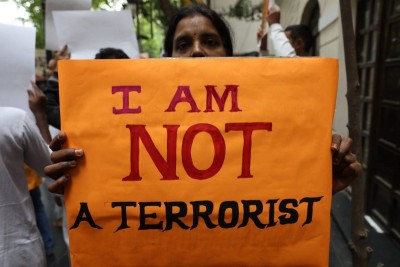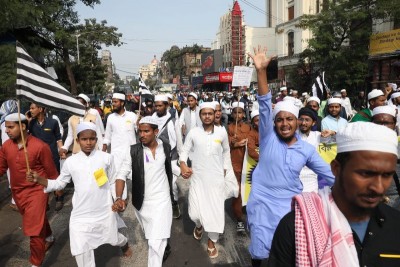
Life is incomplete if we do not have finer elements like knowledge, music, dance, painting, sculpture and crafts: Vice President Naidu
New Delhi, Mar 17 (IBNS): Vice President of India M. Venkaiah Naidu has said that life is incomplete if we do not have finer elements like knowledge, music, dance, painting, sculpture and crafts.
He was addressing the gathering after inaugurating Smt. D.K. Pattammal’s Centenary Celebrations, in Chennai on Saturday.
The Governor of Tamil Nadu, Shri Banwarilal Purohit, the Minister for Fisheries, Personnel and Administrative Reforms, Shri D. Jayakumar and other dignitaries were present on the occasion.
The Vice President said that Smt. Pattammal’s uncompromising adherence to tradition when values were fast changing, her dedication to the art, without aspiring for returns and her judicious selection of musical offerings in her concerts, made her an inspiring personality.
He further said that she was an example of an empowered woman, passionate about music and dedicated to the values she deeply cherished.
Pattammal carved out a path as a professional musician against all social odds and she was a self-taught musician with no formal gurukula training, he added.
The Vice President said that she had a remarkable musical ear that enabled her to absorb the nuances of classical music effortlessly.
He further said that she was a rare genius and her contribution to the world of music satisfies the most critical music critics and create a joyful environment to the common listener, at the same time.
Music is a universal unifier and it has no barriers and in our increasingly conflict-ridden world, music can provide the much needed soothing touch, he added.
The Vice President said that Indian classical music especially carnatic music, has woven noble thoughts, ennobling emotions and melodious notes into a unique seamless, delightful experience.
This blending needs to be appreciated and this cultural heritage and unified holistic perspective on life needs to be celebrated, he added.
Following is the text of Vice President's address:
"I am extremely happy to be with you all at the inauguration of D K Pattammal’s centenary celebrations. It is with great pride and awe that we all remember this musical legend who has left an indelible impression in the hearts of music lovers across the globe.
It is an occasion to recall the life and music of a gifted artist who rose to become one of the female trinity of Carnatic music, the other two being the legendary M.S. Subbulakshmi and iconic M.L. Vasanta Kumari.
It is no accident that Pattammal comes from Tamil Nadu, a land of great cultural heritage. A land where people have patronised preserved and propagated the best traditions in music and dance over many centuries.
Born into a family of musicians, Smt. Pattammal carved out a path as a professional musician against all social odds. She was a self-taught musician with no formal gurukula training. She had a remarkable musical ear that enabled her to absorb the nuances of classical music effortlessly.
Pattammal’s father encouraged her to record her music on three discs by a gramophone company when she was thirteen. She also received tuition from an unnamed Telugu tutor she used to call “Telugu Vadyar”. It is remarkable to note how she continuously kept learning to eventually become an accomplished musician.
Her debuts on All India Radio at the age of 10 and her first public concert at the age of 13 in Madras Rasika Ranjani Sabha were preludes to the invitation from Music Academy when she was seventeen. She sang there uninterrupted for over 50 years and last many years without receiving even a rupee as remuneration. Pattammal rose to be a national star, with record makers, film music producers and music sabhas deeming it their privilege to host her.
Thanks to her husband R Iswaran, who was quick to let go his lucrative government job just to manage her career, Pattammal reached full stature as among the first full time professional woman musicians in this country. It was not just being the first, but being on par, if not better than her male counterparts in all facets of music.
Sisters and Brothers,
Today we celebrate a rare genius.
A musical genius whose contribution to the world of music could satisfy the most critical music critics as well as create a joyful environment to the common listener.
Pattammal had a unique style but seemed to be close to Ariyakudi’s in its solidity and right mix of madhyama and slow speed. She drew from the best musicians and created her own distinct style. She is among the few musicians in the last century who had won the acceptance of their seniors, peers and juniors.
No wonder the former President Dr. Rajendra Prasad was so much moved on listening to her Chetasri Balakrishnam that he requested her to repeat it for him. Politicians, literary luminaries and musicians of various genres from the 1930s till date have held her in high respect.
Sisters and Brothers,
We are remembering today a musical icon on whom were bestowed numerous honours and awards. President’s national award in 1962, Sangita Kalanidhi from Music Academy, Padma Bhushan in 1971, Sangeet Natak Academy fellow and later Padma Vibhushan. These were a fitting tribute to a great musician’s extraordinary talent.
Sisters and Brothers,
We are recollecting the extraordinary achievements of a versatile musical performer who continued to be a successful teacher as well as. She is probably the only musician to have trained a Chinese student to hold a carnatic music concert. To Pattammal, music was divine, transcendental, cutting across gender, age, caste, language and national boundaries.
Behind her achievements was a child like simplicity. She continued to be the perennial student and typical Indian housewife, taking care of her husband, children, grand children and great grand children. Her extended family included several students, who are now spearheading this centenary celebration.
Sisters and Brothers,
Smt. Pattammal was an example of an empowered woman, passionate about music and dedicated to the values she deeply cherished.
If one were to ask oneself as to what Pattammal’s contribution has been to music, probably we will mention at least the following three.
First is her uncompromising adherence to tradition when values were fast changing.
Second is her dedication to the art, without aspiring for returns.
Third is her judicious selection of musical offerings in her concerts.
Every composition she took up, she studied its structure, analysed its scope and finally moulded into her own style as its most refined version. That is why whatever she sang still stands as a benchmark and guiding light to all.
Dear Sisters and Brothers,
As we see our country rising in stature in world arena, we must pause a little to remember the young Pattammal, who with full support of her father Krishnaswamy Dikshitar sang several patriotic songs in front of thousands during British raj. Her patriotic renditions of Subramania Bharathiyar’s songs included:
“Vetri Ettu Dhikkum Etta” and “Aaduvome Pallu Paduvome”
Infact, she considered that her rendition of Bharathiar’s ‘aaduvome’ at the stroke of midnight on 15th August, 1947 over AIR as the most memorable moment in her life.
D.K. Pattammal’s patriotic fervour is evident in her 55 hits over celluloid starting from ‘Tyaga Bhoomi’ to ‘Hey Ram’ in which she sang soul-stirring songs like Subramania Bharathiyar’s “Thoondir Puzhvinai-p pol” and “Bharatha Samudhayam Vaazhgave”. She had the rare honour of performing at the foundation laying ceremony of Bharati Memorial at Ettayapuram. She could sing Tamil hymns and Hindi Bhajans with equal finesse.
Dear Sisters and Brothers,
I am happy that we are launching the centenary celebrations of this great musician today. India is home to a long tradition of fine arts including music and dance. We have always believed that there is more to life than mere money. Saint Tyagaraja echoes this sentiment when he says in one of his compositions –
“Nidhi Chaala Sukhamaa
Ramuni Sannidhi Chaala Sukhamaa
Nizamuga Telpu Manasaa”
Man doesn’t live by bread alone. We need to constantly nourish our minds and hearts. Knowledge, music, dance, painting, sculpture and crafts have provided this nourishment. Our life is incomplete if we do not have these finer elements. Of these, music transcends many boundaries. We have believed that “Shishur Vethi Pashur Vethi Vethi Gaana Rasam Phanihi”. Even a child and an animal respond to music. So does a serpent.
Music is timeless. It enhances the quality of our lives. Good music is forever embedded in our inner beings, in our consciousness.
Indian classical music is a treasure trove, a rich legacy we have collectively inherited. It has constantly been enriched by great musicians like D.K. Pattammal.
In our increasingly conflict-ridden world, music can provide the much needed soothing touch. In a world of emotional turbulence it can bring in a sense of melodious balance.
Indian classical music especially carnatic music, has woven noble thoughts, ennobling emotions and melodious notes into a unique seamless, delightful experience.
This blending needs to be appreciated.
This cultural heritage and unified holistic perspective on life needs to be celebrated.
Dear Sisters and Brothers,
This is, in my view, a moment to again recall this illustrious heritage and one of the most remarkable icons of this heritage, D.K. Pattammal.
In celebrating her music, we pay a tribute to the melody, the words and the thoughts that make us all proud inheritors of this rich legacy.
I once again congratulate the organisers of this centenary celebration and wish them all the best in their noble endeavour. Let the melodious notes of this great musician pervade the world ushering in greater peace, harmony, understanding and good will.
Jai Hind!"
Support Our Journalism
We cannot do without you.. your contribution supports unbiased journalism
IBNS is not driven by any ism- not wokeism, not racism, not skewed secularism, not hyper right-wing or left liberal ideals, nor by any hardline religious beliefs or hyper nationalism. We want to serve you good old objective news, as they are. We do not judge or preach. We let people decide for themselves. We only try to present factual and well-sourced news.







